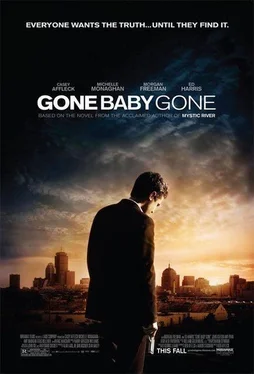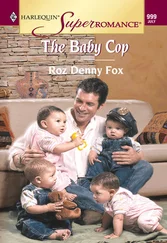When she looked back over at me, the love cleared, and for a moment I sensed either fear or suspicion. “There’s a forest.” She pointed down the road. “Right down there. It’s part of the Purgatory Chasm Reservation. Get some beautiful pictures there, I bet.”
I nodded. “Sounds great. Thanks for the advice.”
Maybe the child sensed something. Maybe he was just tired. Maybe just because he was a little kid and that’s what little kids do, he suddenly opened his mouth and howled.
“Oh-ho.” She smiled and kissed his head again, bounced him on her hip. “It’s okay, Nicky. It’s okay. Come on. Mommy’ll get you something to drink.”
She turned up the sloping driveway, bouncing the boy on her hip, caressing his face, her slim body moving like a dancer’s in her red-and-black lumberjack shirt and blue jeans.
“Good luck with nature,” she called over her shoulder.
“Thanks.”
She turned a bend in the driveway and I lost sight of her and the child behind the same thicket that obscured most of the house from the road.
But I could still hear her.
“Don’t cry, Nicky. Mommy loves you. Mommy’s going to make everything all right.”
“So he has a son,” Ryerson said. “So what?”
“First I heard of it,” I said.
“Me, too,” Angie said, “and we spent a lot of time with him back in October.”
“I have a dog,” Ryerson said. “First time you’ve heard about it. Right?”
“We’ve known you less than a day,” Angie said. “And a dog isn’t a child. You have a son and you spend a lot of time on stakeouts with people, you’re going to mention him. He mentioned his wife a lot. Nothing big, just ‘Got to call my wife.’ ‘My wife is going to kill me for missing another dinner.’ Et cetera. But never, not once, did he mention a child.”
Ryerson looked in his rearview at me. “What do you think?”
“I think it’s odd. Can I use your phone?”
He handed it back to me and I dialed, looked out at Ted Kenneally’s antiques store, the CLOSED sign hanging in the window.
“Detective Sergeant Lee.”
“Oscar,” I said.
“Hey, Walter Payton! How’s the body?”
“Hurts,” I said. “Like hell.”
His voice changed. “How’s that other thing?”
“Well, I got a question for you.”
“A rat-out-my-own-people sort of question?”
“Not necessarily.”
“Shoot. I’ll decide if I like it.”
“Broussard’s married, right?”
“To Rachel, yeah.”
“Tall brunette?” I said. “Very pretty?”
“That’s her.”
“And they have a kid?”
“’Scuse me?”
“Does Broussard have a son?”
“No.”
I felt a lightness eddy in my skull, and the throbbing aches from yesterday’s football game disappeared.
“You’re sure?”
“’Course I’m sure. He can’t.”
“He can’t or he decided not to?”
Oscar’s voice became slightly muffled, and I realized he’d cupped the phone with his hand. His voice was a whisper. “Rachel can’t conceive. It was a big problem for them. They wanted kids.”
“Why not adopt?”
“Who’s gonna let an ex-hooker adopt kids?”
“She was in the life?”
“Yeah, that’s how he met her. He was on Homicide track until then, man, just like me. It killed his career, got him buried in Narco until Doyle bailed him out. But he loves her. She’s a good woman, too. A great woman.”
“But no kid.”
His hand left the phone. “How many times I got to tell you, Kenzie? No friggin’ kid.”
I said thanks and goodbye, hung up, and handed the phone back to Ryerson.
“He doesn’t have a son,” Ryerson said. “Does he?”
“He has a son,” I said. “He definitely has a son.”
“Then where’d he get him?”
It all fell into place then, as I sat in Ryerson’s Suburban and looked out at Kenneally’s Antiques.
“How much you want to bet,” I said, “that whoever Nicholas Broussard’s natural parents are, they probably weren’t real good at the job?”
“Holy shit,” Angie said.
Ryerson leaned over the steering wheel, stared out through the windshield with a blank, stunned look on his lean face. “Holy shit.”
I saw the blond boy riding Rachel Broussard’s hip, the adoration she’d poured on his tiny face as she’d caressed it.
“Yeah,” I said. “Holy shit.”
At the end of an April day, after the sun has descended but before night has fallen, the city turns a hushed, unsettled gray. Another day has died, always more quickly than expected. Muted yellow or orange lights appear in window squares and shaft from car grilles, and the coming dark promises a deepening chill. Children have disappeared from the streets to wash up for dinner, to turn on TVs. The supermarkets and liquor stores are half empty and listless. The florists and banks are closed. The honk of horns is sporadic; a storefront grate rattles as it drops. And if you look closely in the faces of pedestrians and drivers stopped at lights, you can see the weight of the morning’s unfulfilled promise in the numb sag of their faces. Then they pass, trudging toward home, whatever its incarnation.
Lionel and Ted Kenneally had arrived back late, close to five, and something broke in Lionel’s face as he saw us approach. When Ryerson flashed his badge and said, “Like to ask you a couple of questions, Mr. McCready,” that broken thing in Lionel’s face broke even further.
He nodded several times, more to himself than to us, and said, “There’s a bar up the street. Why don’t we go there? I don’t want to do this at my home.”
The Edmund Fitzgerald was about as small as a bar could get without becoming a shoeshine stand. When we first walked in, a small area opened up on our left with a counter running along the only window and enough space for maybe four tables. Unfortunately they’d stuck a jukebox in there, too, so only two tables fit, and both were empty when the four of us entered. The bar itself could sit seven people, eight tops, and six tables took up the wall across from it. The room opened up a bit again in back, where two darts players tossed their missiles over a pool table wedged so close to the walls that from three of four possible sides, the shooter would have to use a short stick. Or a pencil.
As we sat down at a table in the center of the place, Lionel said, “Hurt your leg, Miss Gennaro?”
Angie said, “It’ll heal,” and fished in her bag for her cigarettes.
Lionel looked at me, and when I looked away, that constant sag in his shoulders deepened. The rocks that normally sat up there had been joined by cinder blocks.
Ryerson flipped a notepad open on the table, uncapped a pen. “I’m Special Agent Neal Ryerson, Mr. McCready. I’m with the Justice Department.”
Lionel said, “Sir?”
Ryerson gave him a quick flick of the eyes. “That’s right, Mr. McCready. Federal government. You have some explaining to do. Wouldn’t you say?”
“About what?” Lionel looked over his shoulder, then around the bar.
“Your niece,” I said. “Look, Lionel, bullshit time is over.”
He glanced to his right, toward the bar, as if someone there might be waiting to help him out.
“Mr. McCready,” Ryerson said, “we can spend half an hour playing No-I-Didn’t/Yes-You-Did, but that would be a waste of everyone’s time. We know you were involved in your niece’s disappearance and that you were working with Remy Broussard. He’s going to take a hard fall, by the way, hard as hard gets. You? I’m offering you a chance to clear the air, maybe get some leniency down the road.” He tapped the pen on the table to the cadence of a ticking clock. “But if you bullshit me, I’ll walk out of here and we’ll do it the rough way. And you’ll drop into prison for so long your grandkids will have driving licenses by the time you get out.”
Читать дальше
Конец ознакомительного отрывка
Купить книгу












